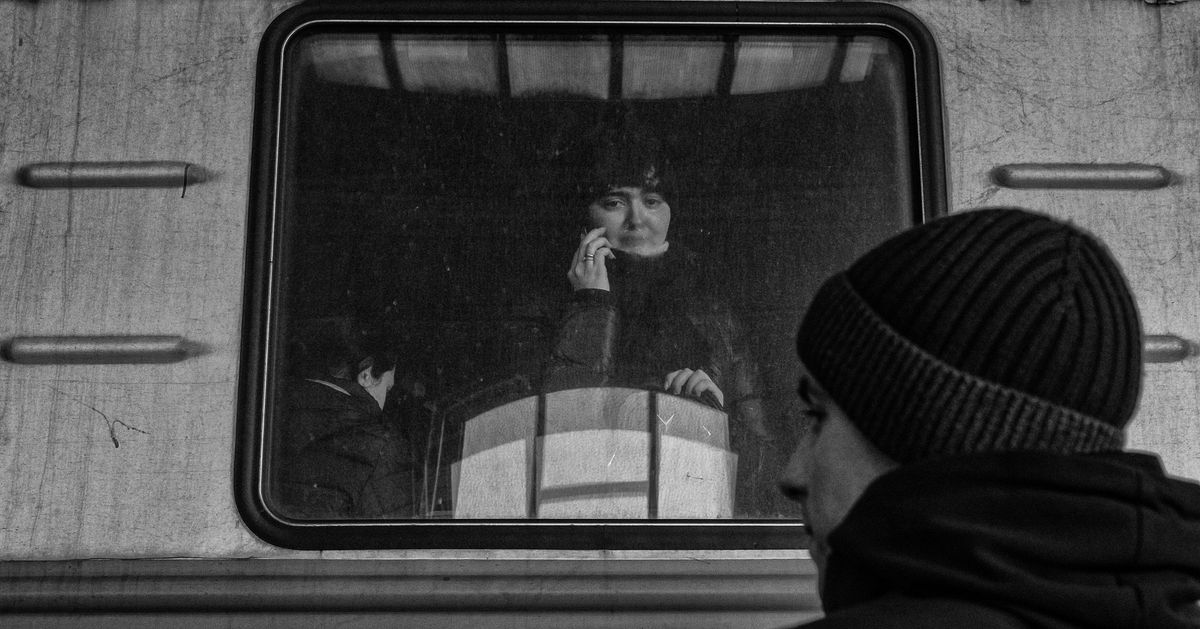LVIV — The war effort is everywhere in Lviv.
The city, the largest in western Ukraine, has swelled with about 200,000 people who were displaced from elsewhere in the country since Russia invaded in late February. Some of its schools and theaters were transformed into shelters to hold the new residents.
Street musicians on the narrow streets sing Ukrainian and foreign songs like they always have, but now with signs that read that half the money will go to the Armed Forces of Ukraine. The street music and birdsong are routinely overlapped with air raids.
The city was miraculously spared during the Second World War, but it has been subject to air shelling twice so far.
The residents of Lviv, along with displaced Ukrainians, are united. Many Ukrainians feel it as a continuation of their long history of fighting for independence.
Seth Herald/Redux for HuffPost

Seth Herald/Redux for HuffPost

Seth Herald/Redux for HuffPost

Seth Herald/Redux for HuffPost
Hundreds of thousands of Ukrainians have arrived from abroad to help their country and join the Armed Forces. The number of volunteers already exceeds the current capacity to train and equip them. So mostly those with previous military experience are being called into service, and others are put on a reserve list. Men and women, young and old, right and left, people of every background and profession are fighting shoulder to shoulder.
Civilians are not sitting back. Some of them have undergone training on first aid and the basic rules of handling weapons. Others make camouflage nets or unload and sort humanitarian aid. People donate to private and public initiatives buying drones, vehicles and other military equipment.
Volunteers prepare trucks to be sent east to areas directly affected by the warfare. The volunteers come from a slew of professions — managers, IT specialists, university professors and more — all gathered to process the boxes of foreign aid sent by the Ukrainian diaspora and other supporters abroad.

Seth Herald/Redux for HuffPost

Seth Herald/Redux for HuffPost

Seth Herald/Redux for HuffPost
There are many supplies, but in a country where roughly every fourth citizen has left home, the demand is still very high. The biggest needs are medicine, hygiene items, or simply food and clothes. Not to mention protective equipment for soldiers.
One displaced woman, Aide, was celebrating her birthday. Aide, 48, is of Azerbaijani heritage but has lived in Ukraine since she was 13. She has been forced from her home twice due to Russian aggression.

Seth Herald/Redux for HuffPost
In 2014, she and her family fled from Donetsk to a town near Kryvyi Rih when the war started and the Ukrainian government lost control over eastern parts of the country. She was working in a local hospital there serving the food to the patients. Aide’s daughter was killed in a shelling in 2014, and her son was abducted by Russian proxies to fight against Ukraine. Aide says he never talked about what he experienced there after he refused to fight against his own country.
This year, Aide, her son and her grandson were forced to flee yet again, this time to Lviv. They hope to go abroad once they obtain the necessary documents.

Seth Herald/Redux for HuffPost

Seth Herald/Redux for HuffPost

Seth Herald/Redux for HuffPost

Seth Herald/Redux for HuffPost

Seth Herald/Redux for HuffPost

Seth Herald/Redux for HuffPost
Like every war, this one brings casualties. In Lviv, the mourners usually pay their final tribute to the fallen warriors in the splendid baroque Saints Peter and Paul Garrison Church.
The number of military and civilians who died in this unprovoked war is yet unknown — the latest civilian casualty estimate from the United Nations is 4,521, though the actual number is likely higher.
Many people have lost their homes. In Chernihiv and Kharkiv, the residential neighborhoods on the outskirts were the first targets of massive shelling. Some cities, like Volnovakha and besieged Mariupol, almost ceased to exist as such. Kyiv also has a number of damaged buildings, but its suburbs have weathered the biggest assaults. Bucha, Irpin, Hostomel and Borodyanka have become known worldwide for the looting, destruction and atrocities authorities say Russian troops carried out.
For millions of Ukrainians, the world was shattered. Now they are making every effort to win this war and reinstate peace.

Seth Herald/Redux for HuffPost

Seth Herald/Redux for HuffPost
Photo Director: Christy Havranek, Senior Photo Editor: Chris McGonigal, Deputy Politics Editor: Elise Foley, Copy Editor: Jillian Capewell
